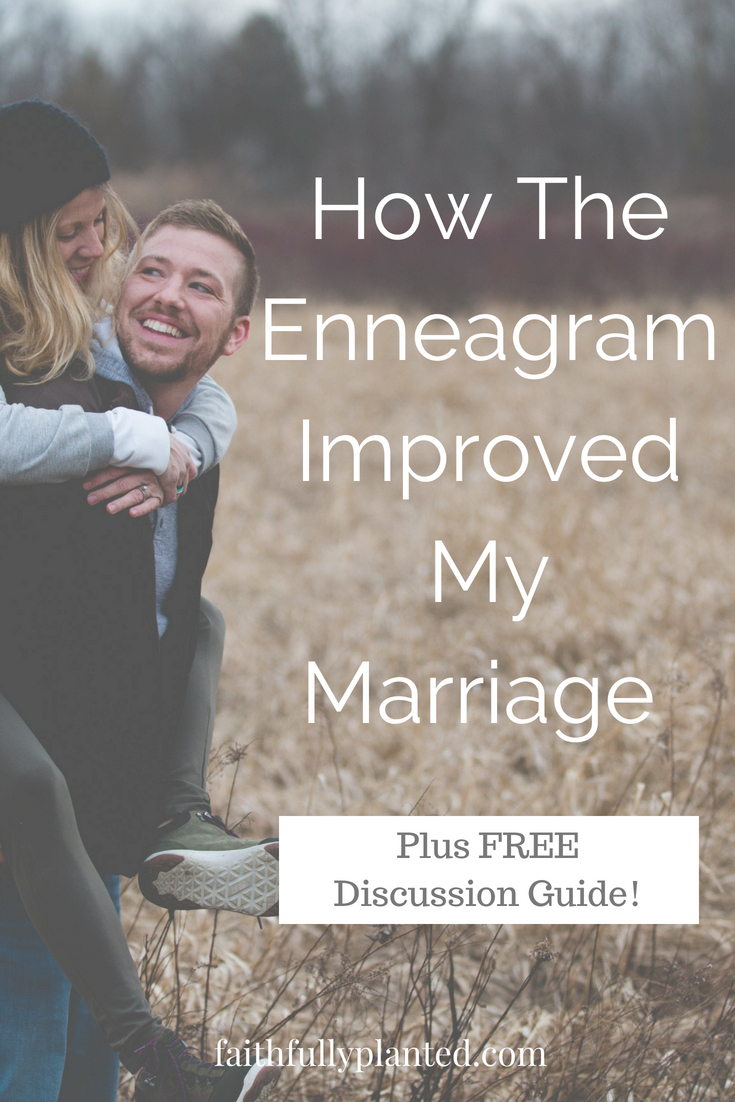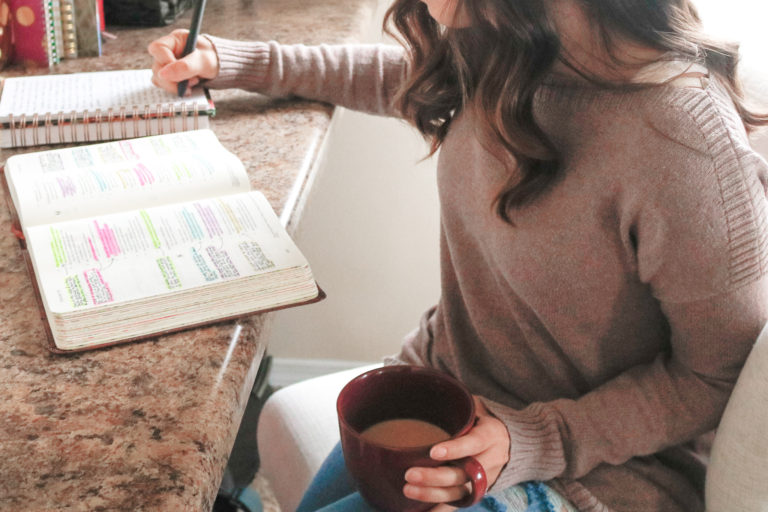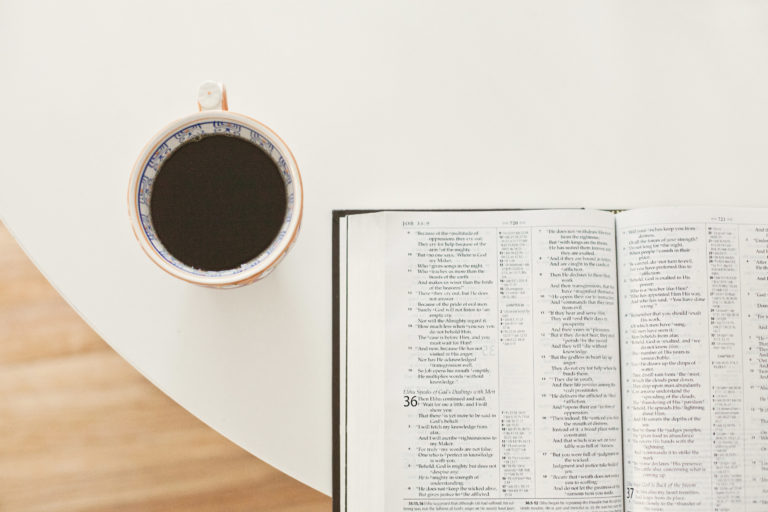How the Enneagram Improved My Marriage

This post contains some affiliate links. If you make a purchase using my link, I may receive a small commission. I only recommend companies and products that I love and trust. This keeps the coffee brewing and the words flowing, so thank you for supporting Faithfully Planted!
What Is The Enneagram?
Recently both my husband and I learned about a personality and psychological framework called the Enneagram. Our college degrees are in Psychology, so we are both very drawn to personality typing and how childhood experiences affect adulthood and relationships.
A coworker of mine introduced me to the concept and he spoke highly of the positive effect it can have on personal growth. But also warned me not to delve too deep unless I was ready to take a hard look at myself and grow from that information.
Heeding his warning, I took some time to learn more about the Enneagram itself before diving into typing myself or my husband. We discussed the framework in general and his type at length before I decided to learn about my own. I also read through The Road Back to You by Ian Morgan Cron & Suzanne Stabile and it was a great introduction to the system and each of its types.
In short, the Enneagram “Types” personality archetypes. Teachers believe each of us are dominantly one type, with strong tendencies from 2 other types, called wings. The Enneagram types are mirrors in which we look into the good and bad of our own human nature. It describes our dominant, basic personality type and helps us to see our deepest motivations for our actions. This knowledge leads to the ability to become more self-aware of our own fear-driven tendencies and improve upon them.
Learning about mine and my husband’s Enneagram types did two things for my marriage; it changed my perspective on my husband’s motives for his own actions and shed light on how my actions can affect him.
RELATED: 5 Tips For Loving Your Spouse (Even When You Don’t Like Them)

It Helped Me Understand My Husband’s Actions
My husband is a Type 9 or “The Peacemaker.” This type values peace and harmony which means that he often retreats into himself with mindless activities in order to avoid stress. He often naps or plays video games to escape. I did not understand how deeply he needed time like this or why he was doing it until we started discussing the Enneagram.
His personality strives for peace, tranquility, and harmony. Life often interrupts this and causes him inward distress. He is also an introvert and needs alone time to recharge, which aligns with his Enneagram type. Before I was aware of this, I interpreted his need for peace and slowness as laziness or dismissal of my needs.
My personality is much more Type-A and rigid so I struggled to comprehend how he could sleep or play video games when there were things that needed to be done. This led to many unnecessary disagreements in our marriage because he was unable to clearly communicate his needs because he didn’t fully understand them.
I learned that I was demanding more from him than he could give.
Learning about his motivations and his needs helped me to be more understanding and patient with him. It helped shift my perspective and realize he was not ignoring my needs or disregarding my feelings. He was simply seeking to find peace and stability for his world.
Through discussions about the Enneagram, he also learned some of the motives and fears behind his actions, which helped us both to understand him better. His type fears loss and separation from those they love so deeply. They will do just about anything to keep the peace and avoid conflict.
He is so agreeable that it can often be frustrating for me when we are making decisions together. He often does not state his opinion or his desire because he is trying to remain “close” to me and keep our relationship peaceful.
This improved how we handled our disagreements and how I approach him to discuss difficult topics.
It Helped Me Understand How My Actions Affected My Husband
I am a Type 2 or “The Helper.” This means I am generally caring and generous but I am also a people-pleaser. I want others to like me, approve of me and to find me helpful. Type 2’s have incredibly hospitable and kind personalities, but also have motivations that are not always pure. I can sometimes do nice things for other people because I want them to approve of me or return the favor in order to get my needs met. When they don’t do those things, I can get very frustrated and even feel betrayed by this.
Most of the time, I aim to be helpful and courteous for the sake of serving others. In my unhealthy state, however, I can also be motivated to be helpful because I want others to like me. I become passive aggressive if I offer assistance and kindness to others and it is unacknowledged or unreturned. After learning about Type 2’s, I noticed this was especially true when it comes to my spouse. I often use serving actions as a way to communicate that I have unmet needs.
Knowing this about myself has helped me to check my motivations in my marriage. Now I notice when I find myself upset with my spouse because I am outwardly helpful and serving but really, I am pleading for help. When he doesn’t return the favor of my service, I get frustrated and hurt. This is manipulative and an entirely unbiblical expectation.
Now, I check my heart when I notice myself getting upset or feeling neglected. I can better communicate how I am feeling and clearly ask for what I need. This is something my type specifically struggles with.
My Type is deeply afraid of feeling unworthy or unloved. Knowing this about myself helps me to communicate what I need to feel loved and appreciated.
How It Can Help Your Marriage
Learning how your deepest motives and fears can affect your relationships can be a difficult undertaking. It requires you to first learn about yourself and see parts of yourself that you would normally hide from. However, if you are in a self-reflective and open state, learning these things can lead to improvement in one’s own self-image, friendships, family relations, dating relationships, and marriages.
So, if you’re ready to grow and learn to be a better spouse, dive in with an open mind.
Step One: Learn More About the Enneagram
You can read more about the Enneagram as a whole at The Enneagram Institute. It is important to understand the system before you try to understand where you fit within it. Unlike some other personality theories or systems, the Enneagram types are all interconnected. You will likely find pieces of yourself in all of the types but you will find one that stands out from the rest.
Each type has pieces of other types in within it. So, if you don’t understand how a Type 3 acts, you won’t fully understand your own type.
Step Two: Type Yourselves
You can take a typing quiz from TrueSelf.com, though I recommend reading a book on the Enneagram and typing yourself. This is a more accurate way to type than the test.
The Road Back to You and The Complete Enneagram: 27 Paths to Greater Self-Knowledge are both great books to start out with. The Road Back To You discusses the Enneagram from a Christian perspective and includes 10 “Paths to Growth” at the end of each Type’s chapter, which were both very appreciated as I was reading it.
Step Three: Learn About How Your Type Interacts with Your Spouses Type
You can even learn specifically about relationship pairings if both you and your spouse decided to dive into your types. This free website will discuss how your personalities are different and similar and will point out potential problem areas.
Another resource would be The Path Back to Us by the same authors of The Road Back To You as previously mentioned. This book focuses specifically on how each type interacts with other types in all kinds of relationships, including marriage.
Step Four: Discuss What You Have Learned with Your Spouse
Once each of you has learned about your type and reflected on it, discuss this with one another. Read about the other person’s Type and talk about your marriage in context with the Enneagram. If you’re not sure where to start, I created an Enneagram Discussion Guide for Couples to get you talking!
Each question will help you delve into your types and discuss the effect your motives and fears have on your marriage. It will also help you use this knowledge to strengthen your relationship.









I took the Typing Quiz…and OH MY GOODNESS!!! I love it!! For someone who is very much all about personality profiles, this was like food for my soul! I will TRY to get my hubby to take it also (or at least the Enneagram test…which I’m even more into!) but he’s not really a “talker” and he’s not one to sit with me and analyze and discuss. So I’m not sure he’ll be into it. But knowing the different types as well as I do, I can pretty much guess what type he is, and I can learn about his type and my type on my own and that alone can be super beneficial!
So glad Emily! Yes, just knowing about your own is still incredibly beneficial! The best testimonial for anything is living it out yourself! He just might want to do know what has you growing so much! Haha. Praying he is receptive!
This is so fascinating! I’ve heard so much about Enneagram but definitely need to delve deeper. Thanks for the resources. I can totally see how it would be helpful in marriage, too!
Hi Laura! Yes, I was also completely fascinated by the Enneagram and learned so much about myself and others when I decided to dig deeper! You are so welcome for the resources, they helped me so much and I hope they bless you too friend!